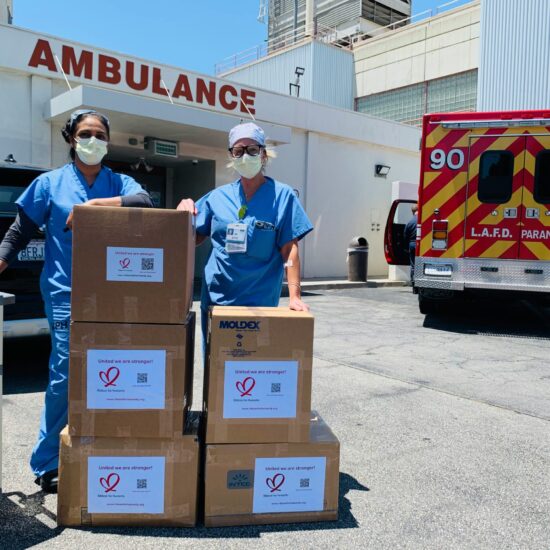Nursing is a hard job. It comes with seemingly endless expectations of selflessness, and I have always prided myself on the fact that no matter how tough things get, I don’t cry. I step into my armor and keep the drama at bay—or, rather, that’s what I used to do, until an attack by a patient’s family member left me sobbing under the nurse’s station.
We were waiting for a trauma case to finish in the OR. Minutes before the patient rolled out, a short, stout woman wearing thigh-high boots stormed into the unit and demanded to know where her boyfriend was. She was in a complete rage. “Where’s Dempsey?!” she shouted, eying the unit like a hawk looking for blood.
I approached her and reassured her that Dempsey was not in the recovery room yet, but that everything was okay. I made every effort to be kind and informative. She remained aggressive and accused us of lying to her. Her voice and mood escalated until the doors from the OR swung open and Dempsey arrived safely into the recovery bay.
Things after his arrival were routine: IV fluids and pain meds were administered. I was in charge that evening and I asked the nurse, as I always do, if he needed any help; he insisted that he had it covered. As I turned to walk away, Dempsey’s girlfriend called something out at me. I didn’t hear what she said, so I kept walking. Then she said it again. This time I heard, loud and clear.
I responded, genuinely confused: “Excuse me, are you talking to me?”
“Yeah! I’m talking to you, you *&$% [insert homophobic slur].” My heart started pounding and the tiny hairs on the back of my neck lined up like spurs. I was shaking but managed to choke out the words, “I’m calling security.”
She continued to curse me. Then she threatened my life. “I’ll kill you, you disgusting *&$%.”
That’s when I screamed for help. My co-workers were frozen. They too were in shock. Were they immune to such common acts of workplace violence, the daily subtle yet cutting verbal attacks that nurses face while on duty? That’s when I broke. Tears streamed down my face, I fell to my knees and hid under the desk while she stomped around the unit looking for me.
The rest of the story is a chain of rather discouraging events. Security eventually came but didn’t do much, aside from assess the situation and wait for Dempsey to leave. I overheard someone tell my boss on the phone that my reaction was “emotional.” I was furious. In the days after the event, I was assured that steps were being taken so that this woman wouldn’t be allowed in the hospital again.
These efforts were made in vain, though: seven months later, on another Friday night, Dempsey showed up seeking treatment for a postoperative infection. Dempsey and his girlfriend were transferred to another unit at my manager’s insistence, and while I appreciated this, I found it humiliating that I had to be quarantined for my safety.
They never should have been allowed back on the premises—or at the very least, I should have been informed prior to their arrival. Initially, my manager had asked me if I wanted to press charges, but subtly discouraged me from doing so, suggesting that it might be “a lot to handle” between work and school. No one fully explained my rights or offered supportive services.
This sort of thing happens to nurses more than other health care workers. The Department of Justice reported that nurses are 57% more likely to be assaulted than doctors and that up to 70% of assaults go unreported. There are plenty of reasons for this, including fear of losing one’s job and the normalization of violence against nurses.
Reporting of violent acts against nurses is historically low, despite their high prevalence. Often nurses fear retaliation from hospital administration, lack the knowledge or support from administration due to vague reporting policies, and in turn normalize the behavior, expecting that violence is “just part of the job.” Speaking up may be seen as a sign of weakness or incompetence. Hospital administrators may also be concerned that reporting violent acts may risk patient satisfaction scores and the bottom line.
There remains a need for more research, more workplace violence prevention training for health care workers, and greater public awareness that violence against a nurse is a punishable crime.
I decided that a grassroots approach fit my style. I made it my policy as head nurse to empower my coworkers to become advocates of their own safety. I’m helping them identify escalating behavior and encouraging them to ask for help if they feel threatened.
There are many online guidelines and resources available for nurses and other health care workers. The Emergency Nurses Association has a Workplace Violence Toolkit, and the Occupational Safety and Health Administration just updated its Guidelines for Preventing Workplace Violence for Healthcare and Social Service Workers. And the National Institutes for Occupational Safety and Health offers a free online course, Workplace Violence Prevention for Nurses.
Nurses are not made of steel, and we DO exist. In fact, perpetuating the idea that there’s no place for emotion in health care is a form of self-inflicted violence. Until nurses stop acting like blank-faced, tiny toy soldiers, our lives will continue to be at risk every time we step into our venerable baby blue scrubs and show up for work.










Lyn Underhill / May 7, 2015
Excellent job, Reni !! Stick to you guns !! Empowering your co-workers is the best !! Hopefully this will get the proper attention to stop this !! Your Mom would ge so so proud !! Sending youuch love & prayers. Best to you, Lyn Underhill.
/